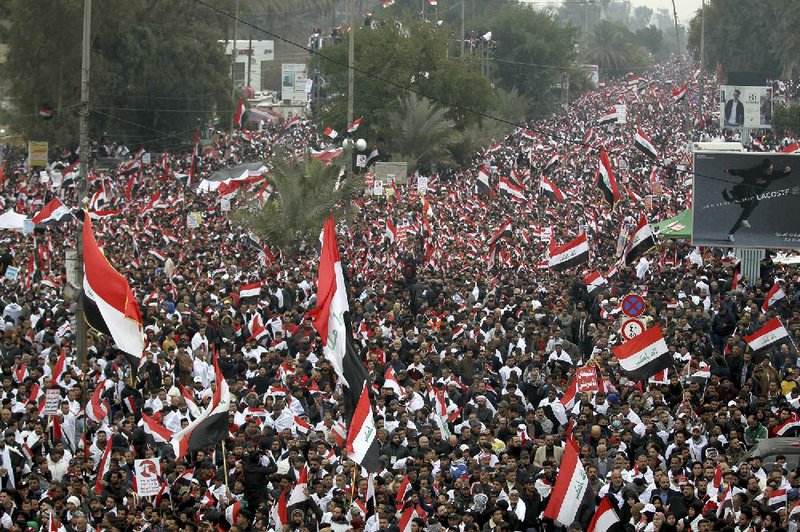BAGHDAD -- Waving national flags and banners denouncing President Donald Trump, tens of thousands of Iraqis marched peacefully through Baghdad on Friday to demand the ouster of U.S. troops from their country in a protest organized by a populist Shiite cleric.
Later Friday night, two anti-government protesters were shot and killed by security forces in separate demonstrations a few miles from where the main anti-U.S. rally had taken place, two medical officials and one security official said.
The Iraq rally by followers of Muqtada al-Sadr and Iranian-backed militias came amid heightened tensions following the U.S. drone strike Jan. 3 near Baghdad's airport that killed top Iranian Gen. Qassem Soleimani and senior Iraqi militia commander Abu Mahdi al-Muhandis, fanning anti-U.S. sentiment.
Meanwhile, the Pentagon disclosed Friday that 34 U.S. service members suffered traumatic brain injury in Iran's missile strike this month on an Iraqi air base in retaliation for Soleimani's death. Half of the soldiers and airmen have returned to work.
Eight of the injured arrived in the United States on Friday from Germany, where they and nine others had been flown days after the Jan. 8 missile strike on Iraq's Ain al-Asad air base. The nine still in Germany are receiving treatment and evaluation at Landstuhl Regional Medical Center, the largest U.S. military hospital outside the continental United States.
Jonathan Hoffman, the chief Pentagon spokesman, said the eight in the U.S. will be treated at Walter Reed National Military Medical Center at Bethesda, Md., or at their home bases. The exact nature of their injuries and their service and unit affiliations were not disclosed.
There were no official estimates of the turnout for Friday's anti-U.S. rally in Iraq, and organizers gave varying figures, but it clearly fell short of the "million-man" march that had been called for by al-Sadr.
Officials and experts said the rally was the cleric's attempt to capitalize on brewing anti-American feeling and show he had the upper hand among Iraqis as political elites wrangle over who should be the next prime minister.
Large crowds gathered on the Muslim day of prayer as loudspeakers blasted, "No, no America!" at a central square. Some of al-Sadr's followers were shrouded in white capes to symbolize the fact that they were ready to die for the cause.
"Hey Trump! We will not allow you to turn Iraq into a battlefield," read one banner. A child held up a poster reading, "Death to America. Death to Israel."
Apparently seeking to show control, his supporters did not clash with the heavy security presence or target the separate, anti-government protests in neighboring Tahrir Square, a possibility feared by activists.
In his weekly Friday sermon, Grand Ayatollah Ali al-Sistani, Iraq's most revered Shiite cleric, called on political parties to stop stalling and move the talks forward.
"The formation of the new government is constitutionally long overdue, it is necessary for the various parties concerned to cooperate," al-Sistani said in a sermon delivered via a representative." It is an important step toward resolving the current crisis."
Roads and bridges leading to the heavily fortified Green Zone, the seat of Iraq's government and home to several foreign diplomatic compounds including the U.S. Embassy, were barricaded by concrete barriers. Iraqi security forces stood guard, blocking access to the gates of the zone.
No one was killed in the attack on Ain al-Asad, even though the U.S. had no missile defense systems there to protect from potential attack. Hoffman said Friday that deploying one or more Patriot anti-missile systems to Iraq is among options now being weighed by military commanders. The U.S. had deployed numerous Patriot systems to other countries in the region as protection against Iranian missile attack, including in Saudi Arabia, but a strike on Iraq was seen as less likely.
Some members of Congress this week pressed the Pentagon for more clarity on the scope of the TBI cases resulting from the Iranian attack. Rep. Bill Pascrell, D-N.J., founder of the Congressional Brain Injury Task Force, wrote senior Pentagon officials Thursday requesting additional details on casualties from the attack.
On Friday morning, Defense Secretary Mark Esper directed the Pentagon's acting undersecretary of defense for personnel and readiness, Matthew Donovan, to begin working with the staff of the Joint Chiefs to review how military injuries are tracked and reported -- not just TBI cases but battlefield injuries of all kinds, Hoffman told reporters.
"The goal is to be as transparent, accurate, and to provide the American people and our service members with the best information about the tremendous sacrifices our war fighters make," Hoffman said.
Information for this article was contributed by Qassem Abdul-Zahra, Samya Kullab, Robert Burns, Nasser Karimi and Murtada Faraj of The Associated Press.
A Section on 01/25/2020
